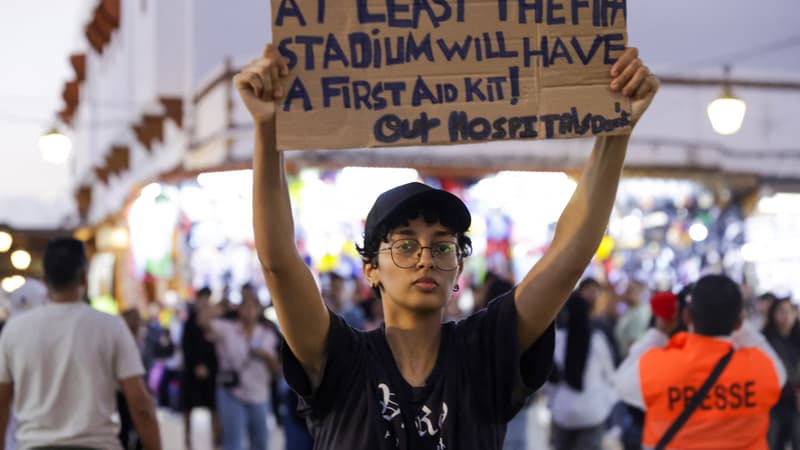A founding social movement for Moroccan youth. Since September 27, the generation of young people aged 18 to 34 has been demonstrated in the streets of many cities in the Cherifian kingdom to obtain better health, education and corruption services. Called “Genz 212”, the group is organized on social networks. Despite their calls to pacifism, clashes have marked this social conflict, killing three and many injured. Arbitrary arrests have occurred.
“We are asking for the dissolution of the current government for its inability to protect the constitutional rights of Moroccans and respond to their social demands,” Genz 212 said in a statement addressed to the King of Morocco, Mohammed VI, also requested the opening of a “just judicial process” to continue corruption officials.
What is this movement “Genz 212” in search of a mysterious authorship and what does the symptom look for? Mustapha El Mnasfi is a teacher-investigator at Mouay Ismaïl University in Morocco. His research work focuses on the citizen participation of young people and civil society in Morocco.
How to explain that the social movement exploded now?
“This movement, called” Genz 212 “, was born in a national context marked by criticism aimed at the Government on the health sector. It also emerged in an international context characterized by inflation, the economic repercussions of war between Russia and Ukraine, as well as the impact of the conflict in the Middle East in the world economy.
It should also be taken into account that certain Asian countries, especially Nepal and Indonesia, have experienced the appearance of similar movements. Unlike other protest mobilizations that Morocco has known since 2011, it has not had a clear leadership or a defined coordination structure.
The young people who were members were born in the 1990s to 2010. The movement did not organize their meetings in the premises of political parties or associations in conflict with the authorities. Until now, nothing is known about the people behind this movement, who coordinate the actions, write the press releases and manage accounts on digital platforms. The members that constitute the nucleus of the movement remain invisible, probably without a previous political course or experience. “
What is Genz’s incarnate and is just a youth movement?
“This movement could be described as a digital response movement, that is, a movement that takes digital platforms as a starting point for its coordination and mobilization. It is distinguished from traditional dispute forms, such as those made by unions or unemployed graduates.
These young people are politicized through social networks; However, they often remain apolitical, in the sense that they are not members of the political parties and sometimes even maintain a negative perception with respect to political parties and actors, particularly towards local elected officials.
Young people who constitute this movement were born in a context marked by the digital revolution. They are strongly influenced by the dynamics observed in Morocco and abroad. Thanks to their smartphones, they constantly establish comparisons between their reality and those of the democratic countries called. They observe the quality of life and the rights enjoyed by young people in the West, and claim, in one way or another, similar conditions in their own country. “
What are the demands of this movement?
“This movement affirms reforms linked to public social policies, especially in three sectors: health, education and employment. In other words, it focuses its demands on public policies instead of reforms aimed at the political system itself.
Since the Covvi-19 crisis, Moroccan citizens, in particular young people, have realized that social policies had little concrete impact on their daily lives. This crisis has highlighted the fragility of health and employment sectors.
This situation is explained by the election of Moroccan governments, since the 1980s, to abandon the basic social sectors to comply with the recommendations of international financial institutions such as the World Bank and the International Monetary Fund. After more than four decades, Morocco, like other countries, suffers the consequences today. “
What is the difference between the “Genz 212” and the February 20 youth movement during the Arab spring?
“I think there is a difference between the movement of generation Z and that of February 20. The latter claimed reforms linked to the political system, in particular to the establishment of a parliamentary monarchy, while the movement of generation Z highlights social demands, especially in the education and health sectors.
Therefore, we face two different movements, and this difference is also reflected in the profile of the people involved in it. The current movement is not specifically supported by the youth of the political parties, while the February 20 benefited from the support of youth organizations of leftist parties, parties and trends qualified as “Islamist”, as well as human rights associations.
In addition, the current regional context is very different from that of 2011, marked at that time by dispute movements in most Arab countries. The 2011 statements were not limited to social policy reforms; In some cases, they demanded the fall in the regimes.
Therefore, the particularity of the current protest movement in Morocco is that its demands are not political; Until now, they are still essentially social.
Can we talk about an absence of trust between young people and political parties?
“Certainly, in Morocco, there is a problem in terms of mediation institutions, in particular political parties and associations of civil society. This is explained by the fact that these actors no longer play their role of supervision and mediation.
Integrated by public authorities, parties and associations have gradually abandoned their function of control of public action to assume further a role of authority attendees, instead of a role of counterproduction and supervision of society.
Rif’s protest movement in 2016 confirmed this decrease in mediation institutions and highlighted the emergence of actors who no longer trust political parties or civil society associations. “
Source: BFM TV


